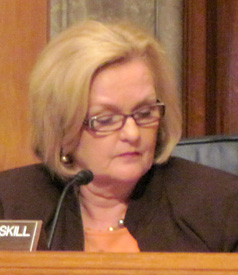Washington – Sen. Claire McCaskill wants to know how many federal agencies have used tax dollars to hire public relations consultants to “spin” their images — and why.
What piqued the Missouri Democrat’s interest was a $234,000 contract the General Services Administration gave to a Kansas City firm for work early this year.
The GSA’s Kansas City office enlisted Jane Mobley Associates to help manage the negative publicity over a longstanding pollution problem at its Bannister Federal Complex and the potential medical fallout.
Mobley responded that it was “a little surprising” that her firm’s work might be controversial.
“It is a staple of the service that government provides to the public,” she said. “The public deserves good, clear communication.
“We think our job is to work well with government staff, to help with the things they can’t do and not get in the way of any of the things they can do. We don’t add an extra layer. We stay out of the limelight.”
Mobley added that her firm was an experienced government contractor.
The GSA oversees the government’s buying and selling of real estate. It owns nearly half of the 310-acre Bannister complex. The rest is owned by the National Nuclear Security Administration, which makes non-nuclear components for atomic weapons.
Both sections of the complex have shown signs of contamination, present largely in the groundwater.
Workers at the complex, which includes a day-care center, have complained about health problems for years but said they were never taken seriously. A number of them have reportedly developed health problems, including cancer, and feared their workplace could be the reason.
McCaskill, chairwoman of a Senate oversight panel on government contracting, said, “I’m not against government advertising for military recruitment or important health information.
“I’m talking about hiring someone to help them spin. This is ridiculous. What did they do for this money?”
According to contract documents, Jane Mobley Associates developed a communications plan to help the GSA explain to a lay audience the technical and scientific nature of the environmental conditions at the complex.
Angela Brees, a spokeswoman for the Kansas City GSA regional office, said it needed additional help because the agency’s media office was small and geared more toward internal communications.
She said the GSA required “a team of experts to come in quickly,” and the Environmental Protection Agency was unable to help.
“This is a unique situation for GSA,” Brees said. “We’re in the business of building buildings and providing customer solutions. We just didn’t have the necessary resources.”
She said that the GSA chose Jane Mobley Associates from an approved list of federal contractors and that its $124 hourly fee was the lowest.
Earlier this month, a GSA inspector general’s report found that the agency had been negligent about monitoring for pollution and had misled the public about the potential problem. The report made no mention of the Mobley firm or its contract, which ran from February to mid-May.
It did note that the GSA was “currently taking substantial steps to protect the occupants of the Complex” but that “prior to 2010, (GSA) did not have a strong environmental management program for the Complex.”
“Concerns would be brought up,” said Barbara Rice, who has worked at the complex on and off since the 1970s. “But we would be told, ‘Oh, it’s not a problem. We’re going to fix this is old building. There’s nothing wrong. You’re OK.'”
The government agreed this past summer to begin a cleanup. Meanwhile, it has begun construction of a new weapons plant several miles to the south.
In letters to both the GSA and the Office of Management and Budget, McCaskill asked for detailed explanations of the government’s use of outside “publicity experts.”
The federal Government Accountability Office has said agencies are outlawed from using “publicity or propaganda” that involves “self-aggrandizement” or “puffery,” as well as “covert propaganda” that does not explain whether federal money is behind an enterprise.
McCaskill said her focus on the GSA contract could serve as a “springboard” for a wider investigation.
“The federal government should not be spending money on contracts to manage the press,” she said. “They should answer questions openly. If this happens so easily at one federal agency, it may be going on in others.”
Join us in defending the truth before it’s too late
The future of independent journalism is uncertain, and the consequences of losing it are too grave to ignore. To ensure Truthout remains safe, strong, and free, we need to raise $27,000 in the next 24 hours. Every dollar raised goes directly toward the costs of producing news you can trust.
Please give what you can — because by supporting us with a tax-deductible donation, you’re not just preserving a source of news, you’re helping to safeguard what’s left of our democracy.
